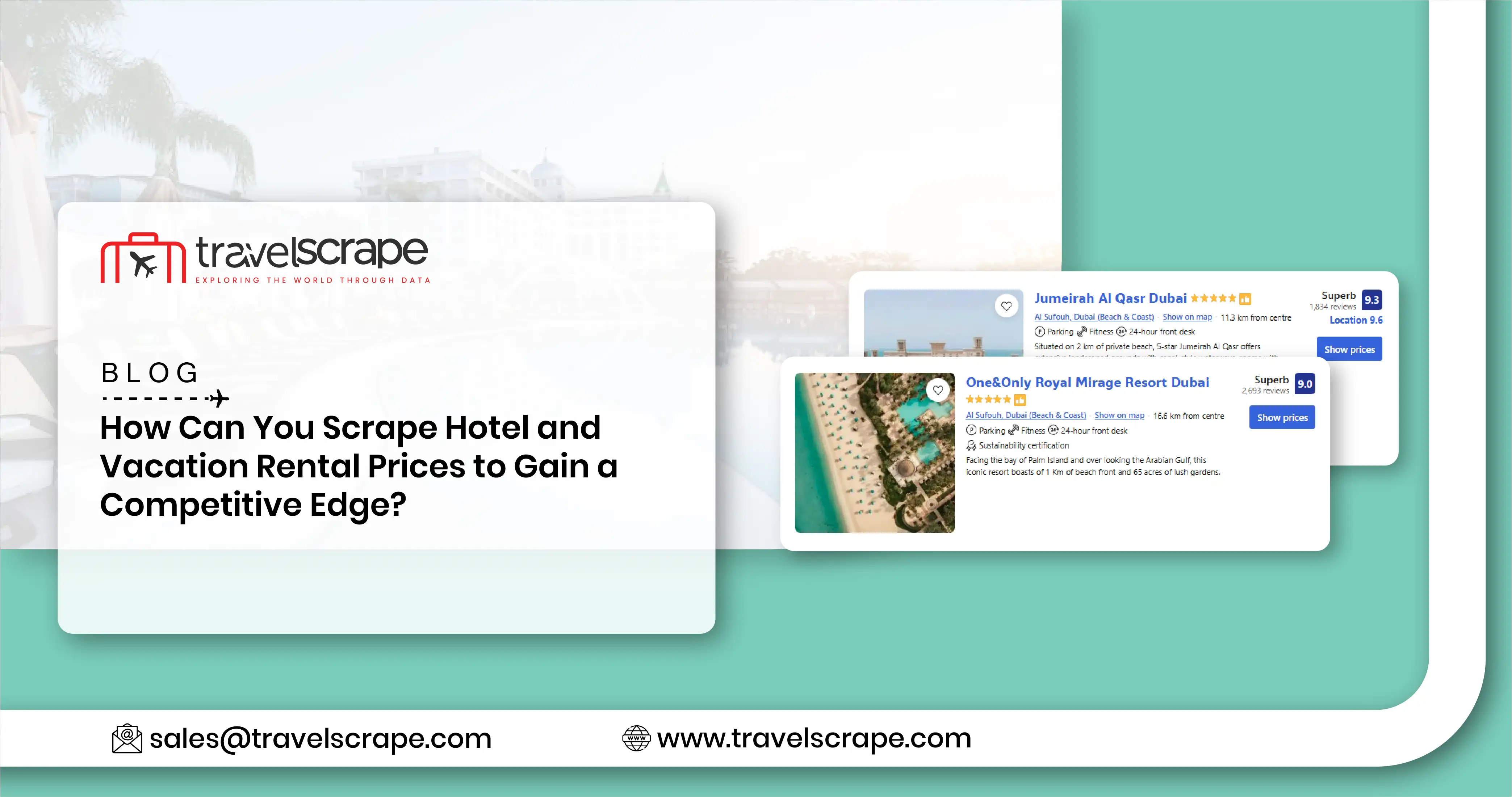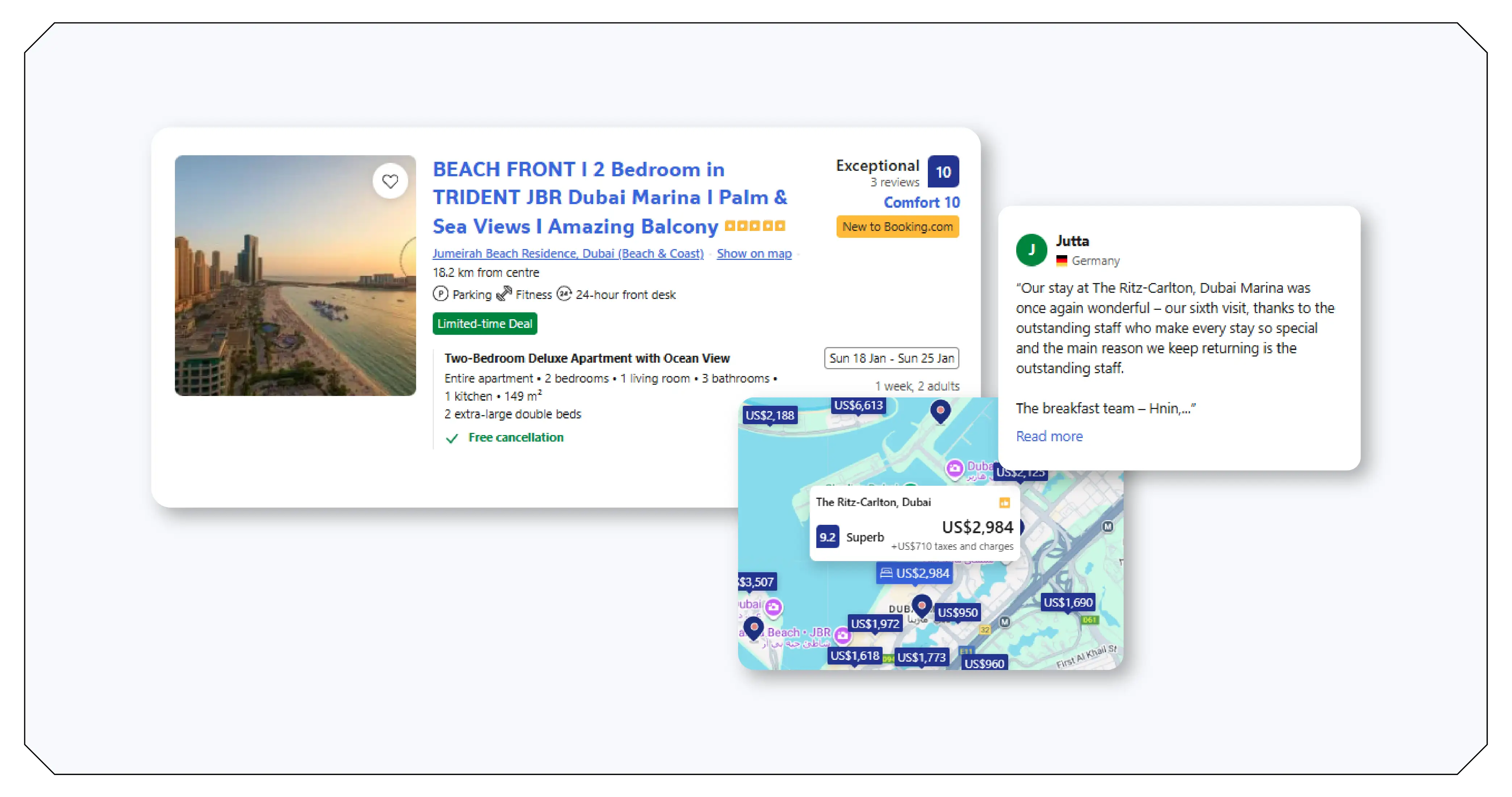How Can You Scrape Hotel and Vacation Rental Prices to Gain a Competitive Edge?

Introduction
The travel and hospitality industry thrives on timely insights and competitive intelligence. As global tourism continues to surge, understanding how accommodation pricing shifts across regions and seasons has become vital for maintaining profitability. Businesses, from independent hoteliers to global booking platforms, are now turning toward data-driven solutions to uncover demand patterns and optimize rates dynamically. By leveraging advanced scraping technologies to Scrape Hotel and Vacation Rental Prices, brands can monitor thousands of listings daily across Airbnb, Booking.com, and Vrbo to gain actionable insights on price trends and consumer behavior.
Modern Hotel Data Scraping Services allow travel businesses to go beyond simple rate tracking—they enable real-time market forecasting. This data empowers hotel revenue managers, analysts, and travel startups to fine-tune their pricing models, offer competitive deals, and respond faster to demand fluctuations. Furthermore, using analytical dashboards powered by scraped data, companies can extract Vacation rental market trends to understand how consumer preferences shift by location, season, and booking window.
Understanding the Power of Price Scraping in Hospitality

Price scraping refers to the automated extraction of pricing information from websites and online platforms. In the hospitality industry, this involves gathering structured data on hotel rooms, vacation rentals, and special offers across online travel agencies (OTAs) and rental marketplaces. For instance, scraping platforms like Airbnb, Booking.com, and Vrbo can reveal how rates change daily based on factors like local events, weekends, holidays, and demand surges.
The insights gathered from Vacation Rental Data Scraping Services help businesses detect price volatility and identify underpriced or overpriced listings within specific markets. By continuously monitoring competitor pricing, accommodation providers can adjust their strategies dynamically to attract more bookings while safeguarding profit margins.
How Scraping Platforms Like Airbnb, Booking.com, and Vrbo Reveal Seasonal Pricing Trends?
Each travel season brings distinct pricing behaviors shaped by regional events, weather conditions, and travel preferences. Scraping data from Airbnb, Booking.com, and Vrbo provides granular visibility into these patterns. For example:
- Summer months typically see spikes in coastal and mountain destinations.
- Winter seasons bring surging rates in ski towns and festive cities.
- Holiday weeks and special events like music festivals or conferences often trigger short-term price hikes.
Through consistent Web Scraping Hotel rate comparison, hospitality analysts can identify which markets experience high elasticity in pricing and which ones maintain stable average daily rates (ADR). These insights allow for proactive adjustments in room pricing to capture peak demand periods while maintaining occupancy in slower seasons.
Monitoring Competitor Rates for Hotels and Vacation Rentals
Competitive intelligence is the backbone of effective pricing management. By scraping data across booking platforms, hotels and vacation rental hosts can build comprehensive competitor rate maps. These datasets typically include:
- Listing titles, amenities, and location coordinates
- Room or property types (standard, deluxe, suite, entire home)
- Base rates, cleaning fees, and discounts
- Review counts and average ratings
- Availability and booking lead times
Such data not only supports scraping for hospitality market intelligence but also assists in forecasting potential occupancy changes. For instance, if nearby competitors drop prices before a local festival, a property owner can quickly adjust rates to remain competitive without sacrificing profit.
Insights for Dynamic Pricing Strategies and Revenue Maximization
Dynamic pricing, when backed by reliable scraped data, helps hotels and vacation rentals align their pricing with real-time market conditions. Here’s how data-driven pricing models can maximize revenue:
- Demand Forecasting: Scraped data reveals which locations see early booking surges, allowing managers to raise prices accordingly.
- Rate Parity Management: Ensures consistency across OTAs to avoid brand dilution and booking loss.
- Event-Based Pricing: Recognizing price fluctuations during regional holidays or festivals helps capitalize on high-traffic periods.
- Competitor Benchmarking: Continuous monitoring of nearby properties prevents overpricing or underpricing.
- Occupancy Optimization: Adjusting rates for last-minute availability helps fill rooms that might otherwise remain vacant.
By combining these strategies, hotels can better understand the balance between rate adjustments and occupancy goals.
Role of Guest Reviews and Ratings in Price Analysis

Price trends do not exist in isolation; they are closely linked to customer perception. Integrating a Hotel Guest Review Dataset into pricing analytics provides deeper context. By analyzing reviews and ratings, hotels can identify factors that justify higher pricing or signal a need for improvement. For example, positive mentions of cleanliness, service quality, or location convenience often correlate with increased willingness to pay among travelers.
Moreover, review sentiment analysis can forecast potential shifts in booking behavior, allowing managers to align price strategies with perceived value.
Real-Time Vacation Rental Price Monitoring
Market competitiveness depends heavily on timing. Through real-time vacation rental price monitoring, travel companies and property owners can identify sudden price changes in their target regions. Automated systems can flag underperforming listings, track peak demand hours, and alert managers to market shifts. This proactive approach ensures pricing remains both attractive and profitable.
Additionally, integration with business intelligence tools can visualize these changes across timelines, helping analysts pinpoint ideal pricing windows and demand peaks.
Extracting Hotel Market Demand Through Data-Driven Insights
Scraping data also facilitates deep demand analysis across cities and regions. By combining rate and availability information, analysts can extract Hotel Market Demand insights such as:
- Average length of stay across booking platforms
- Seasonal variations in occupancy
- Most booked property categories (e.g., family suites, shared apartments)
- Price sensitivity across demographic segments
These insights enable hotel chains and short-term rental hosts to realign their offerings, repackage deals, and introduce targeted discounts for specific traveler profiles.
Enhancing Business Strategy with Scraped Travel Data
Data scraping not only supports pricing intelligence but also fuels larger business strategies. When merged with travel data such as flight costs, local attractions, and event calendars, accommodation providers gain a complete picture of traveler intent.
For instance:
- Cross-analyzing scraped hotel data with airline fare trends predicts future demand spikes.
- Combining booking platform data with social media sentiment can detect emerging travel hotspots.
- Integrating local weather and event datasets can forecast demand cycles more accurately.
This holistic approach helps businesses stay ahead of market trends, improve yield management, and deliver exceptional value to customers.
Challenges and Ethical Considerations
While scraping hotel and vacation rental data provides significant business advantages, it must be performed responsibly. Adhering to platform policies, using APIs when available, and respecting data privacy are crucial steps. Reliable scraping providers implement rate limits, proxy rotation, and structured data formats to maintain compliance and prevent disruptions.
By using ethical and legally compliant Vacation Rental Data Scraping Services, companies ensure data accuracy without risking penalties or reputation damage.
How Travel Scrape Can Help You?
- Real-Time Competitive Rate Monitoring: Our Hotel Data Scraping Services continuously track competitor prices across major OTAs like Booking.com, Expedia, and Airbnb, enabling you to adjust rates dynamically and stay ahead in the market.
- Accurate Market Demand Insights: We extract detailed booking trends, occupancy patterns, and seasonal rate fluctuations to help you understand regional demand shifts and optimize pricing strategies effectively.
- Comprehensive Property Intelligence: Our scraping tools collect granular details—property descriptions, amenities, reviews, and availability—empowering you to benchmark performance and identify gaps in your offerings.
- Dynamic Pricing Optimization: By combining real-time price data with demand analytics, our service helps you set profitable rates, improve occupancy, and maximize revenue across channels.
- Customizable Data Delivery: Receive structured hotel datasets in your preferred format (CSV, JSON, API), ensuring seamless integration with your BI dashboards, CRM tools, or revenue management systems.
Conclusion
In an era defined by data, scraping tools have become indispensable for understanding and optimizing hospitality pricing strategies. By combining insights from Airbnb, Booking.com, and Vrbo, travel brands can predict demand surges, set competitive rates, and enhance profitability across diverse markets. Leveraging Vacation Rental Listing Dataset insights, companies can continuously evolve with traveler behavior and stay aligned with market expectations.
Ultimately, integrating Vacation rental and hotel price intelligence into revenue management systems enables hoteliers and property owners to make informed, agile pricing decisions. As competition intensifies across global markets, tapping into comprehensive Travel & Tourism Datasets ensures that every pricing move is strategic, data-backed, and perfectly timed for success.
Ready to elevate your travel business with cutting-edge data insights? Scrape Aggregated Flight Fares to identify competitive rates and optimize your revenue strategies efficiently. Discover emerging opportunities with tools to Extract Travel Website Data, leveraging comprehensive data to forecast market shifts and enhance your service offerings. Real-Time Travel App Data Scraping Services helps stay ahead of competitors, gaining instant insights into bookings, promotions, and customer behavior across multiple platforms. Get in touch with Travel Scrape today to explore how our end-to-end data solutions can uncover new revenue streams, enhance your offerings, and strengthen your competitive edge in the travel market.